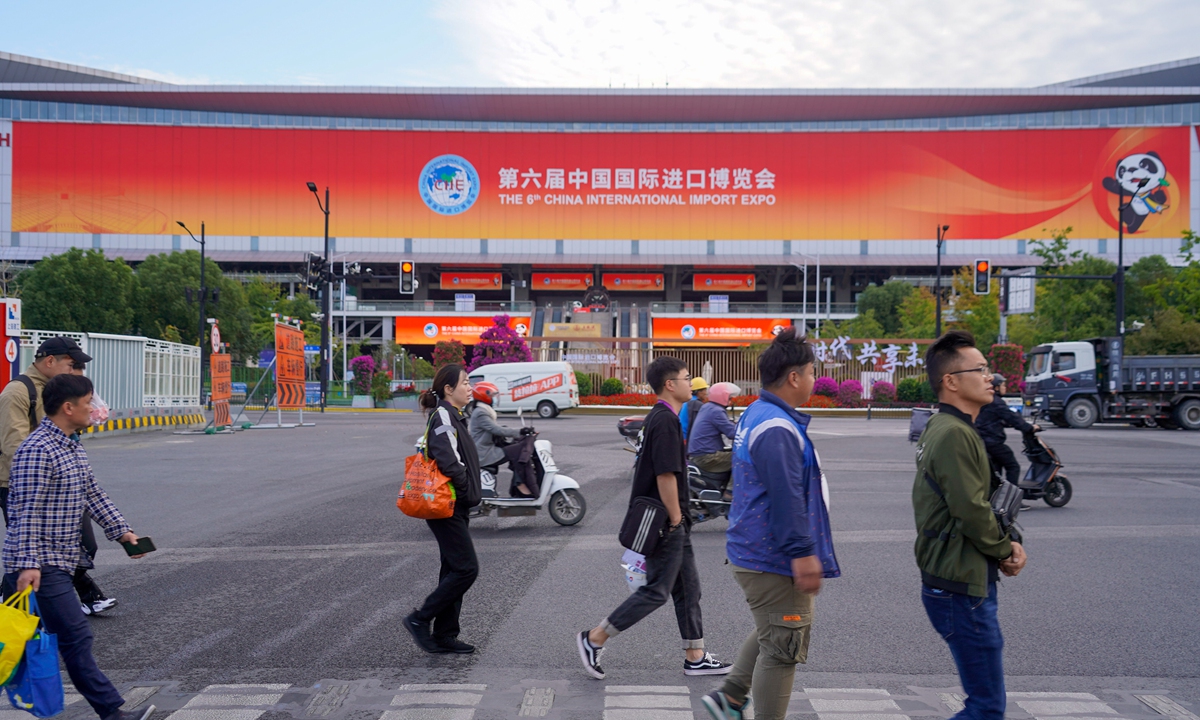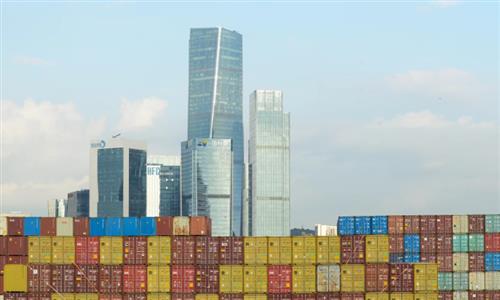
People cross a street in front of the National Exhibition and Convention Center (Shanghai), the main venue for the sixth China International Import Expo (CIIE), in Shanghai on October 29, 2023. The sixth CIIE is scheduled to take place from November 5 to November 10. More than 3,400 exhibitors and 394,000 professional visitors have registered to attend, fully returning to pre-pandemic levels, according to organizers. Photo: VCG
In a concerted effort to bolster foreign investment, various regions across China have unveiled comprehensive strategies, emphasizing the creation of an attractive, market-oriented and legally sound business landscape, as stated in local government sessions this week.
According to the Ministry of Commerce, China witnessed a surge in foreign investment in 2023, with 53,766 new foreign-invested enterprises landing in China, up 39.7 percent year-on-year, with the actual use of foreign capital amounting to 1.1339 trillion yuan ($158.2 billion).
Prominent developments included the construction of major projects of global enterprises. In Beijing, Toyota completed the first phase of construction of a fuel cell research and development and production base. In Shanghai, Schneider Electric inaugurated a 6,500-square-meter factory and Tesla announced the launch of its megapack battery manufacturing plant.
With China launching a series of policies to promote financial investment and attract overseas capital to integrate into China's economic development, it's likely there will be a rise of foreign investment in China this year, Tian Yun, a veteran economist based in Beijing, told the Global Times on Thursday.
In attracting foreign investment in 2024, regions like Southwest China's Yunnan Province and East China's Zhejiang Province have set ambitious targets, with Zhejiang aiming to introduce more than $20 billion, focusing particularly on the manufacturing sector.
South China's Guangdong Province and East China's Shandong Province are pushing forward with "Invest in Guangdong" and "Invest in Shandong" campaigns, introducing significant investment projects and encouraging foreign-funded enterprises to reinvest their profits.
With China making further improvements in trade regulations and rules governing capital inflows and outflows, it is anticipated that more foreign capital will choose to invest in China, especially in the rapidly developing high-tech industries, Tian said.
In a landmark development, Saudi Basic Industries Corp confirmed its investment decision on the Sino-Saudi Gulei Ethylene Complex Project in East China's Fujian Province on Sunday, with a total investment of about 44.8 billion yuan. This project represents the largest single investment in a Chinese-foreign joint venture in Fujian to date.
Given the current global economic instability, China offers a stable market and development opportunities for global capital. As global economic cycles evolve, it is expected that an increasing amount of foreign capital will opt to invest in China, Tian noted.
In addition to regional efforts, the Chinese central government is also actively expanding openness to foreign investment. On January 8, the Ministry of Commerce emphasized the importance of promoting a stable increase in foreign investment, with new initiatives that include relaxing foreign investment entry barriers and enhancing foreign investment services, to build a market-oriented and lawful business environment.
In a significant move toward financial opening, the National Association of Financial Market Institutional Investors announced that 10 more foreign-funded institutions have been approved as lead underwriters or underwriters of debt financing instruments for non-financial enterprises. This approval marks a major advance in China's efforts to integrate more deeply into the global financial market.

